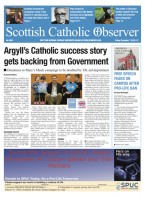December 7 | ![]() 0 COMMENTS
0 COMMENTS ![]() print
print

Catherine Farrelly explains why pro-life students’ fight for university recognition is so vital
Over the past month there have been quite a few stories about student unions at various universities censoring pro-life societies. As students at the University of Strathclyde, we had a four-year battle before our society was affiliated.
The battle began when Strathclyde Catholic Association applied to the student union for funding so that some members could go to the SPUC youth conference in 2015.
Unfortunately, this funding was denied due to the existing pro-choice policy. Although this was disheartening, we decided to begin a Students for Life society in order to start a conversation about pro-life ethics on campus including abortion, euthanasia, crisis pregnancy support and post-abortion counselling.
After various setbacks, we finally discovered there was no reason we couldn’t affiliate our society.
So in 2016 we submitted an application to the students’ union. Affiliation is important because it allows societies access to university facilities including venues, a stall at the Freshers’ Fair and allows the affiliate to apply for support grants.
As our application awaited approval, a no-platform policy was proposed to ban pro-life societies at Strathclyde.
It was argued that any pro-life society posed a danger to women on campus and would spread misinformation.
It was also claimed they would violate the campuses safe space policy.
This stance was based on inaccurate information and rested on a ridiculous claim that a society most of whose members were women would endanger other women.
Banned
Despite our best efforts, which included pointing out that the proposal violated the Equality Act 2010 and was therefore illegal, the no platform policy was passed and the Students for Life society effectively banned.
Concerned about the censorship we were experiencing, the society felt we had no option but to publicise our case, and articles were published in many newspapers including The Herald.
We hoped by going to the press we could put pressure on the students’ union to revoke this policy and allow our society to affiliate.
Although we received a lot of support across Scotland and beyond, from people and organisations which were both pro-life and pro-choice, the union would not budge.
Equality
In March 2018 our legal advisor submitted a complaint to the students’ union. In this, we were able to point out the no-platform policy violated equality policy at Strathclyde Students Union, the University of Strathclyde and the 2010 Equality Act.
From looking at the law it became very clear that banning a pro-life group simply because of their beliefs amounted to discrimination and violated our freedom of speech.
After an investigation by the president of the students’ union, they came to the same conclusion. In October, students voted down the no-platform policy. This month, Students for Life became an affiliate of the union.
It has been a long battle, and, it’s fair to say, the membership of the society is relieved it has finally come to an end.
‘Worrying trend’
But other students at the University of Glasgow and the University of Aberdeen have also submitted legal complaints to their respective students’ unions in protest at being denied affiliate status.
It would appear that the use of the no-platform policy to refuse pro-life societies affiliate status is part of a worrying trend in Scotland’s universities.
In previous years, students at the University of Edinburgh had to battle to keep their Students for Life, and SPUC was banned from the University of Dundee’s Freshers’ Fair.
It would appear that at some of our universities—where discussion and debate are supposed to be a key part of the higher education experience—pro-life views are being censored.
This suggests there are some who would prefer to silence or shut down anyone who holds ‘minority’ views.
They seem to think that if you do not share their viewpoint, you should not have a voice. From a free speech standpoint, this is alarming.
Intolerance
Our universities are where our future lawyers, medics, journalists, scientists, engineers and philosophers are studying.
However, it seems an atmosphere of intolerance is also being bred on Scotland’s campuses.
Indeed, this year the government even pointed out that students with minority views experience unjust restriction and censorship at various UK universities.
This raises the question: which viewpoint will be next to be silenced?
It also makes me wonder whatever happened to the sentiments of that famous French philosopher Voltaire: “I disapprove of what you say but I will defend to the death your right to say it.”










